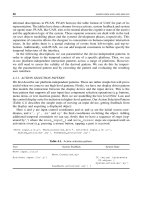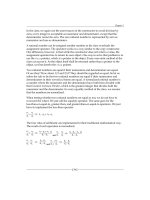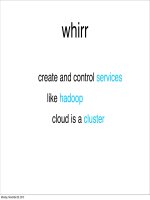Cloud foundry developers cloud native applications 3 pdf
Bạn đang xem bản rút gọn của tài liệu. Xem và tải ngay bản đầy đủ của tài liệu tại đây (23.59 MB, 387 trang )
Cloud Foundry for Developers
Deploy, manage, and orchestrate cloud-native applications with ease
Rick Farmer
Rahul Jain
David Wu
BIRMINGHAM - MUMBAI
Cloud Foundry for Developers
Copyright © 2017 Packt Publishing
All rights reserved. No part of this book may be reproduced, stored in a retrieval system, or
transmitted in any form or by any means, without the prior written permission of the publisher, except
in the case of brief quotations embedded in critical articles or reviews.
Every effort has been made in the preparation of this book to ensure the accuracy of the information
presented. However, the information contained in this book is sold without warranty, either express
or implied. Neither the authors, nor Packt Publishing, and its dealers and distributors will be held
liable for any damages caused or alleged to be caused directly or indirectly by this book.
Packt Publishing has endeavored to provide trademark information about all of the companies and
products mentioned in this book by the appropriate use of capitals. However, Packt Publishing cannot
guarantee the accuracy of this information.
First published: November 2017
Production reference: 1271117
Published by Packt Publishing Ltd.
Livery Place
35 Livery Street
Birmingham
B3 2PB, UK.
ISBN 978-1-78839-144-3
www.packtpub.com
Credits
Authors
Rick Farmer
Copy Editor
Rahul Jain
Safis Editing
David Wu
Reviewer
Project Coordinator
Sean Keery
Judie Jose
Commissioning Editor
Proofreader
Gebin George
Safis Editing
Acquisition Editor
Indexer
Shrilekha Inani
Francy Puthiry
Content Development Editor
Devika Battike
Graphics
Tania Dutta
Technical Editor
Production Coordinator
Prachi Sawant
Aparna Bhagat
About the Authors
Rick Farmer is one of the founders and a leader of the Pivotal Cloud Foundry Solutions enterprise
consulting and delivery team at Pivotal. Over the last two decades, he established a track record of
navigating complex organizational technology and services to deliver breathtaking results for
mission-critical initiatives at over 70 of the world's most recognizable companies and government
entities. Many of the engagements he has anchored have won various personal and project awards.
Rick unlocks innovation and business value using Cloud Foundry to inject enterprise agility into even
the most challenging environments by aligning digital transformation, technical and business
opportunities. He enjoys speaking at conferences on subjects ranging from Cloud Foundry to Data
Science to Digital Transformation to Agility in the Enterprise. Since 1997, Rick has surfed tropical
events hitting the Texas Gulf Coast. He has a data science visualization project inducted into the
Visualization Hall of Fame at the Harvard School of Engineering and Applied Sciences. He can be
followed on Twitter @rick_farmer.
Rahul Jain is one of the founding members of the Pivotal Cloud Foundry Solutions delivery and
architecture team at Pivotal. He has worked in the field of technology for over a decade, developing
security products and applications. During his day job, he leverages best practices to help solve
technical and business challenges for organizations using the Cloud Foundry platform. He enjoys
researching and blogging on technology-related topics that are difficult to solve. During his free time,
he contributes to the community by creating open source tools to manage the Cloud Foundry platform.
Rahul holds a bachelor's degree in electrical and electronics engineering from University
Visvesvaraya College of Engineering. He can be followed on Twitter @rahulkj.
David Wu has been developing software for over 17 years and has in-depth software and embedded
device engineering experience in financial, photographic, medical, science and technology, and
cinematic/broadcast industries, from the perspective of both enterprise and product development and
for various operating systems such as Windows, MacOS, and Linux. A number of these applications
and products have been highly praised, internationally recognized and have won prestigious awards.
Wu holds a first class honors in the bachelors of computer science at Monash University and a Ph.D.
in computer engineering at RMIT, Australia. In addition to software development, he is also an expert
in image processing, compression, video analytics, and forensic imaging. He currently serves as an
Advisory Solutions Architect at Pivotal, an agent of change helping transform organizations with
Cloud Foundry and build better software. He can be followed on Twitter @_Doc_Dave_.
Acknowledgements
Faith Indigo Farmer for hands-on writing and collaboration during the initial stages of outlining this
book in enormous detail, and for help with early chapter drafts.
Sean Keery for lending us his deep and thoughtful Cloud Foundry expertise in the form of chapterby-chapter guidance and technical reviews that shaped the end product in numerous ways.
Haydon Ryan for his invaluable discussions, insights, and advice that helped shape the content of the
book through the vast lens of his Cloud Foundry experience.
Scott Frederick for the Spring Music test app that has become the de facto Hello World! for every
Cloud Foundry application developer and platform engineer.
Cyrus Wadia for helping arrange the various permissions for us to write this book and to integrate
portions of Pivotal content that help tell the Cloud Foundry story.
Pivotal Cloud Foundry Solutions and the Application Transformation practice at Pivotal Labs is
the hidden voice behind this book. The numerous individuals, past and present, who make up the
global PCFS + AppTx team, under the founding leadership of Dino Cicciarelli, Joe Fitzgerald, and
Matt Russell, are the shoulders of giants that we stood upon to extend their work into this particular
medium. They are the most coveted and elite Cloud Foundry solutions team in the world -- valued
thought-leaders shaping the digital revolution and the transformation of so very many Fortune 1000
companies, government entities, and nonprofit organizations, who are in a position to bring about
innovations that make a real impact and a better world for us all. We are grateful to each of you.
The entire Packt team for their guidance, insights, professionalism, and encouragement throughout the
process of creating this book. They are the unsung team behind the book covers that influence and
shape the global conversation on technologies such as Cloud Foundry that have the potential to change
the world for the better. In particular, we would like to thank our editors Devika Battike, Shrilekha
Inani, and Prachi Sawant for their extraordinary contributions to the book. Also, the efforts of Judie
Jose and Nipukumar Nath, among so many others in the Packt team that helped along the way. Thank
you all.
Pivotal, the Cloud Foundry Foundation and the Cloud Foundry Community. None of this would
have existed without you. Your innovations, insights, and contributions are moving the needle toward
a better, more innovative world, one Cloud Foundry foundation at a time. Thank you!
About the Reviewer
Sean Keery, Minister of Chaos at Pivotal, began hacking obscure video game systems at the age of
13. Sean then developed interpersonal skills while teaching snowboarding in Aspen. Nowadays
we've got Cloud Foundry, choreography, containers and plenty of io. Cluster deployments and IaaS
independence keep Sean occupied. His conference presentations can be found on YouTube. Follow
Sean's tech ramblings on Twitter (@zgrinch). The daily commute is filled with podcasts and chipmunk
bunny hops. Some family time, spicy food, a good book and wrecking the latest toys keep Sean busy
at home.
www.PacktPub.com
For support files and downloads related to your book, please visit www.PacktPub.com.
Did you know that Packt offers eBook versions of every book published, with PDF and ePub files
available? You can upgrade to the eBook version at www.PacktPub.com and as a print book customer, you
are entitled to a discount on the eBook copy. Get in touch with us at for more
details.
At www.PacktPub.com, you can also read a collection of free technical articles, sign up for a range of free
newsletters and receive exclusive discounts and offers on Packt books and eBooks.
/>
Get the most in-demand software skills with Mapt. Mapt gives you full access to all Packt books and
video courses, as well as industry-leading tools to help you plan your personal development and
advance your career.
Why subscribe?
Fully searchable across every book published by Packt
Copy and paste, print, and bookmark content
On demand and accessible via a web browser
Customer Feedback
Thanks for purchasing this Packt book. At Packt, quality is at the heart of our editorial process. To
help us improve, please leave us an honest review on this book's Amazon page at
/dp/1788391446.
If you'd like to join our team of regular reviewers, you can e-mail us at We
award our regular reviewers with free eBooks and videos in exchange for their valuable feedback.
Help us be relentless in improving our products!
I would like to dedicate this book to my mother, Margaret Farmer-Maguire—you are the inexhaustible well of eternal
inspiration for your sons—a profile in persistence, always our happy and tireless warrior, inevitably creating outcomes that
many would have thought impossible. Thank you for choosing me to be your son. An eternity of gratitude is not enough; thanks
for all that you’ve done for our family.
– Rick Farmer
I would like to dedicate this book to my beloved late grandfather N. C. Mittal, parents, sisters, wife, and kids for their
continuous encouragement and support. To my mom, Neena Jain, thank you for backing me and motivating me to try new things
in life. To my wife and friend, Veenu, thank you for your love, patience, and enduring support. Without you all, I would not
have been what I am now.
– Rahul Jain
I would like to dedicate this book to my wife, mother, beloved father and sister, and mentor Dr H. R. Wu and his wife. To my
wife, Sharon, for being there for me and providing me with never-ending loving patience, support, guidance, ideas, and
encouragement. To my parents and sister, thank you for your guidance and support. To my friend and mentor, Dr H. R. Wu and
his wife, Mei, thank you both for your tireless support, guidance, and inspirational discussions. You all have made an important
mark in the chapters of my life, to which these words can never truly express my heartfelt gratitude.
– David Wu
Table of Contents
Title Page
Copyright
Cloud Foundry for Developers
Credits
About the Authors
Acknowledgements
About the Reviewer
www.PacktPub.com
Why subscribe?
Customer Feedback
Dedication
Preface
What is book covers
What you need for this book
Who this book is for
Conventions
Reader feedback
Customer Support
Downloading the example code
Downloading the color images for this book
Errata
Piracy
Questions
1.
Cloud Foundry Introduction
Why Cloud Foundry?
What is PaaS?
The Cloud Foundry definition of PaaS
Who are Pivotal and the Cloud Foundry Foundation?
What is Cloud Foundry?
Cloud Foundry architecture
Cloud Foundry security
Cloud Foundry containers
What are containers?
What is Pivotal Cloud Foundry?
Pivotal Cloud Foundry components glossary
Other Cloud Foundry distributions and public providers
Summary
2.
Cloud Foundry CLI and Apps Manager
The cf CLI
What is Pivotal Web Services (PWS)?
Creating a PWS account
What you get when you register for PWS
Signing up
Installing the cf CLI
Downloading and installing from GitHub
Install using a package manager
Initial setup of the cf CLI
The cf CLI help command
Finding cf CLI commands
Command-specific help
Deploying an application to Cloud Foundry
Targeting Pivotal cf API endpoint
Logging into the Cloud Foundry API endpoint
Pushing a simple application
Accessing the Apps Manager on PWS
Summary
3.
Getting Started with PCF Dev
A brief introduction to TDD
Why PCF Dev?
Comparing PCF Dev to Pivotal Cloud Foundry
PCF Dev technical requirements
20 minutes to cf push with PCF Dev
Installing PCF Dev
Exploring PCF Dev
Deploying a test application to PCF Dev
Clone and build the Spring Music App
PCF Dev housekeeping
Stop
Suspend
Resume
Destroy
Status
Alternatives to PCF Dev
Further reading
Summary
4.
Users, Orgs, Spaces, and Roles
Organizations (Orgs)
Create an Org using Apps Manager
Create an Organization (Org) using the cf CLI
List Orgs using the cf CLI
Spaces
Creating a Space using the Apps Manager
Creating a Space using cf CLI
List spaces using the cf CLI
User accounts
Create a user using the cf CLI
Roles
OrgManager role
BillingManager role
OrgAuditor role
SpaceManager role
SpaceDeveloper role
SpaceAuditor role
Assigning roles to a user using cf CLI
Summary
5.
Architecting and Building Apps for the Cloud
What is a cloud-native application?
The principles of cloud-native design
One codebase, one application
API First
Dependency management
Design, build, release, and run
Configuration, credentials, and code
Logs
Disposability
Backing services
Environment parity
Administrative processes
Port binding
Stateless processes
Concurrency
Telemetry
Authentication and authorization
Graceful fault tolerance
Application migration and the journey to cloud-native design on Cloud Foundry
Becoming Cloud Ready
Modernizing the monolith
Anti-corruption layer
Strangling the monolith
Application modernization and your organization
References
Summary
6.
Deploying Apps to Cloud Foundry
Pushing your first application to Cloud Foundry
What you need before you push
Services
Listing the available services to create
Creating a service
Buildpacks
Deploying your first app onto cf using the cf CLI
Applications versus application instances
The phases of application deployment
The Droplet
Re-deploying the application
Binding a service to the application
Restaging applications versus restarting applications
Manifest files
Monitoring and managing the applications
Monitoring and managing the application using cf CLI
Monitoring your application
Listing all of the applications in a space
Getting the health and status of your application
Viewing application logs
Managing your application
Scaling your application
Application tasks
Routes and domains
Domains, HTTP domains, and TCP domains
Viewing and managing HTTP shared domains
Viewing and managing TCP shared domains
Viewing and managing HTTP private domains
Routes, HTTP routes, and TCP routes
Creating HTTP routes
Creating HTTP routes with the hostname option
Creating HTTP Routes with a Wildcard hostname
Creating HTTP context path routing
Creating TCP routes
Managing routes
Deleting your application
Monitoring and managing applications using Apps Manager
Application Performance Monitoring (APM)
Summary
7.
Microservices and Worker Applications
What are microservices?
Worker applications
Fortune teller worker application
Building and deploying the fortune teller application to PCF Dev
Application resiliency
Resiliency provided by Cloud Foundry
Building resiliency into microservices
Using the Config Server for managing application configuration
Service Registry for application registration and discovery
Circuit breakers and dashboard
References
Summary
8.
Services and Service Brokers
Services on Cloud Foundry
Service binding of applications
User-provided services
Service brokers
Structure of services on a service broker
The Open Service Broker API
HTTP request and response structure
Asynchronous and synchronous operations
Authentication
Custom service brokers on Cloud Foundry
Deploying and registering custom service brokers on Cloud Foundry
Updating custom service brokers
Route services
Enabling route services
Service broker and service instance implementation requirements
Route service deployment strategies
Fully-brokered route service
Static-brokered route service
User-provided route service
Route service example
Service integration strategies
Summary
9.
Buildpacks
Buildpacks on Cloud Foundry
Common buildpacks on Cloud Foundry
Consuming and managing buildpacks on Cloud Foundry
Offline versus online buildpacks
Consuming external buildpacks on Cloud Foundry
Adding a new buildpack to Cloud Foundry
Updating a buildpack on Cloud Foundry
Deleting a buildpack
Existing cached droplets and maintaining installed buildpacks
Deep-dive into buildpacks
How buildpacks actually work with Cloud Foundry
The detect script
The compile script
The release script
The droplet
Creating buildpacks
Creating the Simple-HTTP buildpack
Setting up Buildpack-packager
Creating the buildpack
Installing the buildpack
Test driving the Simple-Http buildpack
Summary
10.
Troubleshooting Applications in Cloud Foundry
Failure due to Org/Space quota settings
Failures due to application crashes
Exited with status 0
Exited with status 4 or status 64
Exited with status 6 or 65
Exited with status 255
Exited with status X
References
Summary









